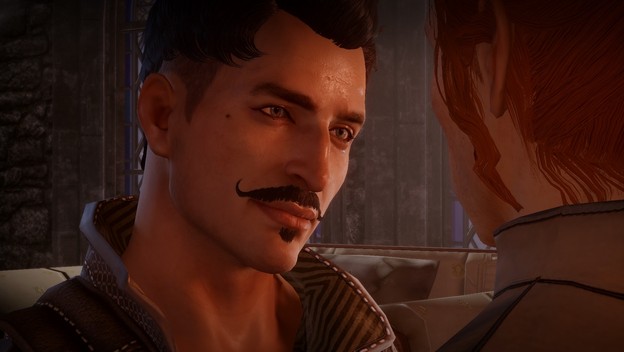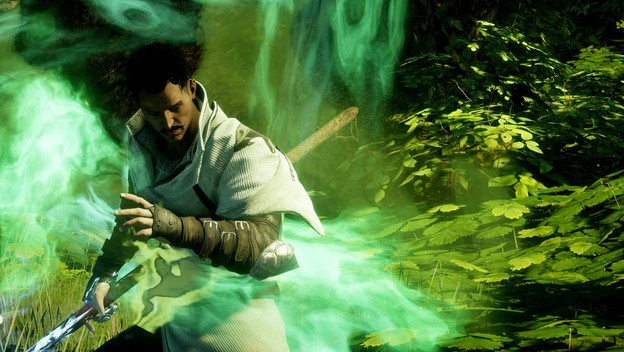Love them or hate them, romances are always one of the most talked-about aspects of BioWare’s RPGs. In Dragon Age: Inquisition, we’re introduced to Dorian, a delightfully snarky mage from the dreaded Tevinter Imperium. Rather than reinforce the stereotype of Tevinters as mustache-twirling villains (granted, he has the mustache in spades) armed with blood magic and a retinue of slaves, Dorian is a passionate reformer who believes his people could be so much more than they are. He’s also a romance option for male Inquisitors.
Dorian’s gayness is a first for BioWare (which previously has had straight or player character-sexual romances) and an extreme rarity in gaming. I applaud the company’s dedication to inclusiveness, but sexual orientation is only part of the reason I think this romance is the best that BioWare—and writer David Gaider in particular—has written thus far. Dorian is a great romantic option because he is realistically flawed. Pursuing a relationship with him feels natural, with the ups and downs that you’d expect when two people try to navigate that crazy thing called love.
Everybody knows somebody who uses sarcasm to deflect life’s slings and arrows, and Dorian fits that bill perfectly. It doesn’t take long to note that the handsome young man uses ridiculously self-aggrandizing humor and general snark to deal with the situation of being a Tevinter mage in a land that reviles him. Annoy him or push his buttons, and he turns prickly and snipes at you. He’ll apologize for that later, showing kindness and self-awareness. I’m pleased that he is allowed to snap at a man he’s in love with. Many games refuse to have love interests who do anything but adore the player character, which is both dull and unrealistic.
Dorian’s sexuality plays into his romantic arc in a way that highlights the struggles many gay people face but is also relatable to everybody. He has some massive and justified “daddy issues” that the Inquisitor helps him approach during his personal story. As a Tevinter noble, he’s expected to marry a powerful female mage, strengthening his bloodline. His refusal to do so, as well as his rejection of a political career, has caused a great deal of conflict with his father. I won’t spoil the details here, but I will note that Dorian’s relationship with his dad isn’t given a neat, pat resolution during the game. Instead it adds dimension to his character as he struggles to come to terms with how that relationship has shaped him.

Once an Inquisitor has gotten into a close relationship with Dorian, his walls of sarcasm start to come down. This is done subtly and without changing his essential personality, which can be a difficult task for a writer. He’s obviously worried about getting hurt, regularly giving the Inquisitor the chance to end the relationship even though it’s obvious that Dorian doesn’t want to do so. I entered into a few conversations with him in which he and the Inquisitor can both try to make the other say what they want out of the relationship first. It made me smile, because that sort of conversation is familiar to anybody who has ever had to have a difficult relationship-related discussion.
All of his issues and faults only make Dorian a better love interest. The way he’s written and voice acted does an excellent job making him flawed but likeable. His well-animated facial expressions show his struggle to hope for the kind of relationship he’s always dreamed of but can’t quite believe is possible. His story emphasizes his basic humanity without watering down the fact that it’s not always easy to be gay. Dorian is written and acted as a multidimensional person, which makes his romance resonate whether you’re gay, straight, bisexual, or want to make sweet love to the Eiffel Tower. I hope a lot of people take the time to experience it, because this is what great storytelling is all about.
